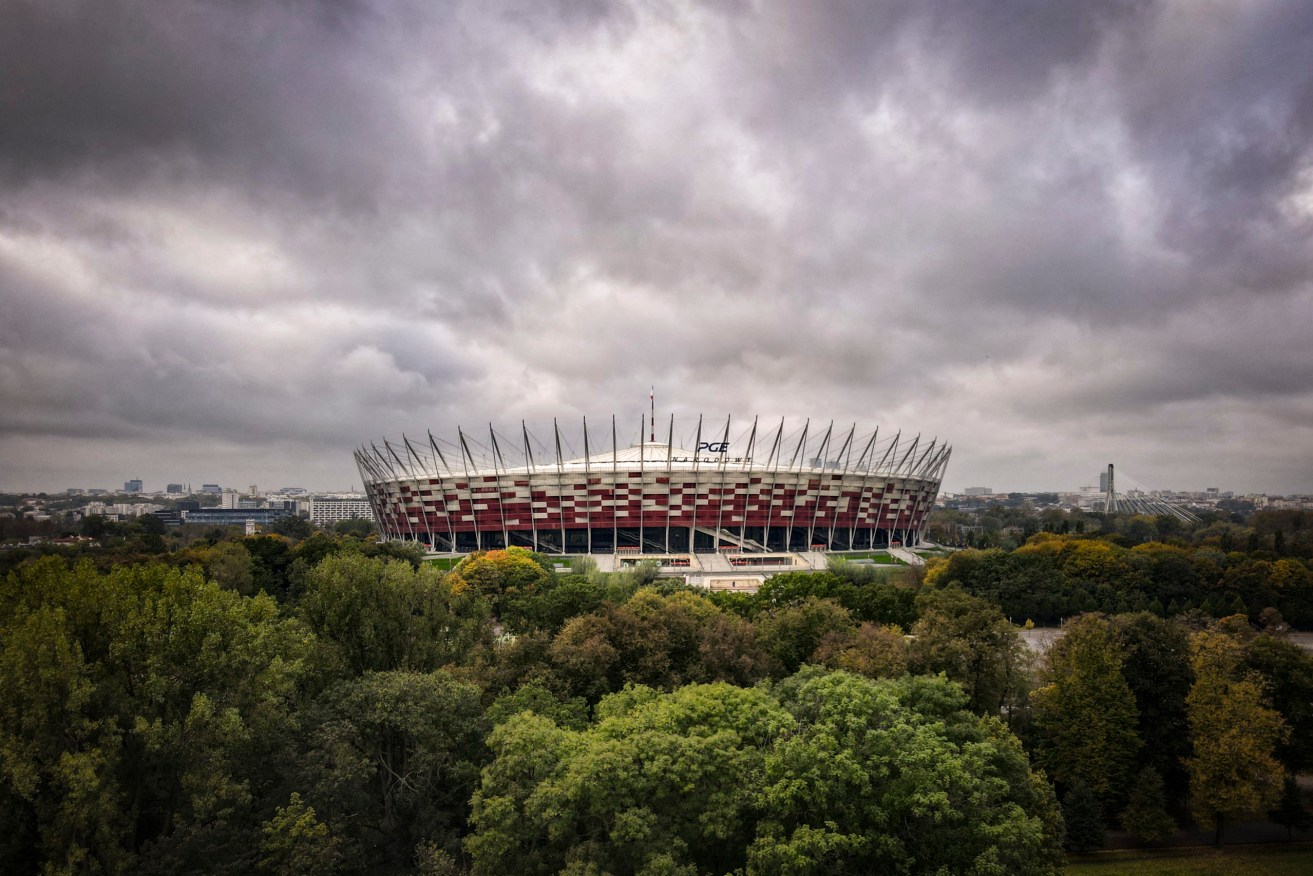Field hospital, curfews as Europe, UK tackle virus second wave “tsunami”
Poland is turning a sports stadium into a 500-bed field hospital, Wales is going into lockdown in which everybody apart from essential workers must stay at home and Belgium has joined France in imposing a curfew as a COVID-19 second wave rises across Europe and the UK.

Warsaw's National Stadium is being set up as a 500 bed field hospital as COVID-19 cases surge. Photo: Jaap Arriens / Sipa USA
Poland’s government is transforming the National Stadium in Warsaw into a field hospital to handle the surging number of people infected with the coronavirus.
Government spokesman Piotr Muller said on Monday that the stadium will have room for 500 patients and will be equipped with oxygen therapy for those who need it.
“We can see that the number of cases is growing so fast that we need to secure places for hospitalisation for those who need it,” Muller said, speaking on TVP Info, the state TV’s all-news channel.
The stadium, with a seating capacity of more than 58,500, was constructed to host matches for the Euro 2012 football championship.
Poland experienced very low rates of infection in the northern spring compared with western European countries but is now witnessing an exponential surge of coronavirus infections.
On Monday the health ministry recorded 7482 new coronavirus infections over the previous day and 41 deaths.
Welsh First Minister Mark Drakeford said he understood that people were tired of coronavirus restrictions but tougher rules were essential as critical care units were already full.
“It will have to be sharp and deep in order to have the impact we need,” he said.
“Everyone in Wales will be required to stay at home. If we do not act now, it will continue to accelerate.”
The lockdown will begin on Friday and end on November 9.
Everybody but essential workers will have to work from home, while all non-essential retail, leisure, hospitality and tourist businesses will have to close, as will places of worship.
Business affected will be supported by a 300 million pound ($A549 million) fund, Drakeford said.
All four nations of the United Kingdom are recording a resurgence of COVID-19, and devolved governments and local councils are introducing a range of measures to try to stem the rise.
Northern Ireland started a four-week period of tougher curbs on Friday, while Scotland has imposed new rules for hospitality.
In Belgium, bars and restaurants have shut down for a month and a night-time curfew is taking effect as health authorities warn of a possible “tsunami” of new virus cases.
The new measures aim to limit social interactions to slow down the exponential growth of the pandemic in the nation of 11.5 million people.
“We are really very close to a tsunami,” Health Minister Frank Vandenbroucke said.
According to the European Centre for Disease Prevention and Control, Belgium recorded more than 700 infections per 100,000 people over the last 14 days, the second-worst European record behind the Czech Republic, which had 828 per 100,000.
Yves Van Laethem, the COVID-19 crisis centre spokesman, said on Monday that 7876 daily new cases were diagnosed on average over the past seven days, up 79 per cent compared to the previous week.
Van Laethem said the situation could be even worse, given delays in the publication of test results.
To fight the spread of the disease, Belgium’s curfew will be enforced from midnight until 5am, at least for a month.
Alcohol sales will be banned after 8pm, while the number of people that residents can see socially outside their households will be reduced from three to just one all month.
People have been ordered to work from home wherever possible. Thousands of students have been affected as several universities have demanded that only one seat in five in lecture halls hosting more than 50 people can be occupied.
As of Monday, 2485 COVID-19 patients were hospitalised in Belgium, including 412 in intensive care. Authorities have warned that intensive care units will hit its capacity of 2000 beds by mid-November if new cases continue to soar at the same pace.
Prime Minister Alexander De Croo said the situation in Belgium now is more serious than it was in March when the country implemented a national lockdown.
“We have three times as many people in intensive care in hospitals. So the situation in the hospitals is serious. It will continue to deteriorate,” De Croo said.
France has reported a massive increase of the number of people hospitalised with COVID-19 while also becoming the eighth country in the world to report more than 900,000 cases since the start of the outbreak.
The daily data showed the partial curfew imposed on nine major cities, including Paris, since Saturday has yet to yield some results.
Experts say it takes two weeks on average for containment measures to show their effectiveness. The number of patients being treated in intensive care units rose by 151 to more than 2000 for the first time since May 17.
-with AAP




